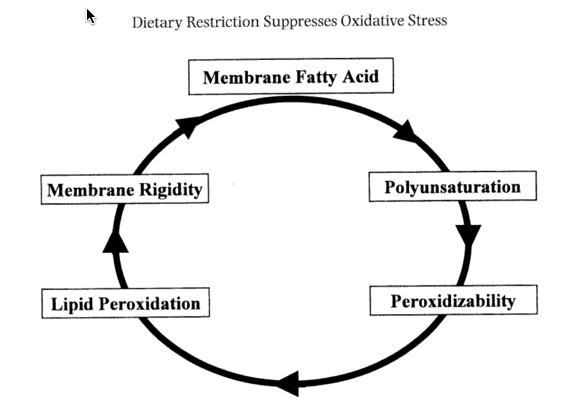
There’s only been one thing that has worked reliably in every species where it has been tried, and which expands and extends life.
The only thing that’s ever worked is some variation of caloric restriction.
The principle is that when you feed animals a diet set below their usual caloric intake, as long as it’s a so-called “balanced diet”, they will often live 30% or 40% longer.
This was what inspired me to try caloric restriction for a couple of years when I was younger.
I had followed the teachings of Dr. Roy Wolford, a UCLA researcher who pioneered caloric restriction in humans.
The fact that Dr. Wolford died of ALS in a wheelchair at a relatively young age had some impact on my decision not to continue pursuing the strategy.
But the other reason I decided not to pursue it, was that it was very hard to do, and I felt it was very unhealthy.
And I think I was right.
But in this newsletter, I want to analyze what it is I think that makes calorie restriction or dietary restriction work to prolong life.
I’m also going to introduce a way to use what we’ve learned to expand and prolong our own lives by 30% to 40%, without using calorie restriction at all.
There are several theories about why calorie restriction works.
 There are also other restrictions besides calories that prolong life a great deal.
There are also other restrictions besides calories that prolong life a great deal.
Methionine (a type of protein) restriction seems to prolong life 30% to 40%.
And iron restriction seems to prolong life, maybe as much or more than other possibilities.
But here is the study where they may have hit the nail on the head concerning why calorie restriction works, and how we might use what we learn in our own lives to live longer without restricting or calories.
The researchers report that
modulating the amount as well as the fatty acid composition of tissue phospholipids. These remarkable findings have been incorporated into the new “membrane peroxidation cycle” concept.
The researchers start by explaining that one of the primary markers of aging in the cell is lipid peroxidation.
This is what happens when you leave vegetable oil out when it gets a sticky residue around the mouth of the bottle.
That vegetable oil has oxidized and turned into lipid peroxide.
The same thing happens in your cells.
When your cells contain a lot of polyunsaturated fatty acids (PUFAs), the PUFAs get incorporated into the membranes of the cells and the mitochondria of the cells.
Then the PUFAs oxidize just like they do in that vegetable oil bottle that you left out.
And when they oxidize in lipid peroxidation, this is what creates an aging, dysfunctional cell that will eventually die.
Now, at this point remember that there are two basic kinds of fat — saturated fat and unsaturated fat.
There’s also monounsaturated fat, but that’s essentially an unsaturated fat, so we’re back to saturated and unsaturated.
Saturated fat is very stable — it doesn’t oxidize.
You can leave a bottle of coconut oil open and leave it out in your kitchen and it will virtually never spoil.
Because coconut oil is almost all saturated fat, and saturated fat does not oxidize easily.
So in the aging model, more and more PUFAs enter the cell, and they mess up the cell because they turn into lipid peroxide.
Calorie restriction and dietary restriction lower the amount of PUFAs that enter the cell.
So there’s less lipid peroxidation going on, and the cell ages more slowly.
These studies suggest that fatty acid unsaturation is a main factor in determining the sensitivity to lipid peroxidation.
And the major reason that dietary restriction works seems to be that it suppresses free radical production at the tissue levels, and
significantly reduces lipid damages.
The researchers propose that restricting PUFAs helps slow down aging this way:
It’s been long known that the aging cell has a stiffer, denser, more rigid membrane.
But now, when PUFAs are kept low, something interesting happens.
The membrane remains fluid and flexible. As the researchers note:

Contradicting the traditional view of age-related membrane rigidity…
our studies show that the membranes of dietary-restricted rats remain fluid even when the cholesterol, triglyceride, and phospholipid increase with age.
Dietary restriction, or just restricting PUFAs, makes the cells extremely resistant to aging.
The researchers note that rats with low PUFAs exhibit a
unique ability to withstand oxidative challenge.
What should you do next?
One of the things that the study shows us is that exercising when you have a poor metabolism may be a bad idea.
Exercise, when you have a good metabolism, helps extend life.
But in the study, exercise with a poor metabolism results in too many free radicals, oxidative damage, and premature aging.
Another thing to keep in mind is that you want to restrict PUFA consumption, including all vegetable oils and fish oils.
And you want to figure out a way to drain your cells of stored PUFAs.
You want to drain them because as long as you have a lot of PUFAs in your cells, you’re constantly exposed to these PUFAs and the premature aging that they cause.
Lastly, you want to focus on good nutrition and good supplementation rather than medications.
These rats exhibit an extraordinary quality of life, and you can too.
The secret lies in improving your metabolism so that nothing really hurts you and you age much more slowly.
Citations
Dietary Restriction Downregulates Free Radical and Lipid Peroxide Production: Plausible Mechanism for Elongation of Life Span
https://www.jstage.jst.go.jp/article/jnsv1973/48/4/48_4_257/_pdf
Click for more information on Dietary Restrictions, for information on Living Healthy.
